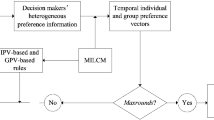Abstract
In the group decision making (GDM) framework we deal with decision problems where several decision makers try to achieve a common solution about a problem. In the literature, we can find two processes to carry out before obtaining a final solution: the consensus process and the selection one. The consensus process is a discussion process where the experts change their opinions in order to achieve a high agreement. The selection process searches the solution.
The consensus reaching process is a very important task for GDM problems regarding the necessity that the solution achieved will be assumed and shared by all experts involved in the GDM problem. It consists of several consensus rounds where the experts discuss and change their opinions in order to improve the level of agreement among them.
In this paper, we propose an optimization of the consensus reaching process in GDM problems by means of an adaptive module that applies different procedures to identify the experts’ opinions that should be changed according to the level of agreement in each consensus round. Usually at the beginning the agreement is low, so the adaptive module will suggest to many experts to change their opinions. However, after several rounds, the agreement will be higher and hence the number of the changes will be smaller.
This work has been partially supported by the Research Project TIC2002-03348.
Preview
Unable to display preview. Download preview PDF.
Similar content being viewed by others
References
Bryson, N.: Group decision-making and the analytic hierarchy process: exploring the consensus-relevant information content. Computers and Operational Research 23, 27–35 (1996)
Kuncheva, L.I.: Five measures of consensus in group decision making using fuzzy sets. In: Proceedings of IFSA, pp. 141–144 (1991)
Herrera, F., Herrera-Viedma, E., Verdegay, J.L.: Linguistic Measures Based on Fuzzy Coincidence for Reaching Consensus in Group Decision Making. Int. J. of Approximate Reasoning, 309–334 (1997)
Herrera, F., Herrera-Viedma, E., Verdegay, J.L.: A rational consensus model in group decision making under linguistic assessments. Fuzzy Sets and Systems 88, 31–49 (1997)
Herrera-Viedma, E., Herrera, F., Chiclana, F.: A Consensus Model for Multiperson Decision Making with Different Preference Structures. IEEE Transactions on Systems, Man and Cybernetics-Part A: Systems and Humans 32, 394–402 (2002)
Herrera-Viedma, E., Mata, F., Martínez, L., Chiclana, F., Pérez, L.G.: Measurements of Consensus in Multi-granular Linguistic Group Decision Making. In: Torra, V., Narukawa, Y. (eds.) MDAI 2004. LNCS (LNAI), vol. 3131, pp. 194–204. Springer, Heidelberg (2004)
Herrera-Viedma, E., Martínez, L., Mata, F., Chiclana, F.: A Consensus Support System Model for Group Decision-making Problems with Multi-granular Linguistic Preference Relations. IEEE Transactions on Fuzzy Systems (2004) (in press)
Kacprzyk, J., Fedrizzi, M., Nurmi, H.: Group decision making and consensus under fuzzy preferences and fuzzy majority. Fuzzy Sets and Systems 49, 21–31 (1992)
Karacapilidis, N.I., Pappis, C.P.: A framework for group decision making support systems: Combining AI tools and OR thecniques. European Journal of Operational Research 103, 373–388 (1997)
Marakas, G.H.: Decision support systems in the 21th century, 2nd edn. Pearson Education, Inc., New Jersey (2003)
Saint, S., Lawson, J.R.: Rules for Reaching Consensus. In: A Modern Approach to Decision Making, Jossey-Bass, San Francisco (1994)
Salo, A.A.: Interactive decision aiding for group decision support. European Journal of Operational Research 84, 134–149 (1995)
Torra, V., Cortes, U.: Towards an automatic consensus generator tool: EGAC. IEEE Transactions on Systems, Man and Cybernetics 25, 888–894 (1995)
Zadrozny, S.: An Approach to the Consensus Reaching Support in Fuzzy Environment. In: Kacprzyk, J., Nurmi, H., Fedrizzi, M. (eds.) Consensus under Fuzziness, pp. 83–109. Kluwer Academic Publishers, Boston (1997)
Author information
Authors and Affiliations
Editor information
Editors and Affiliations
Rights and permissions
Copyright information
© 2005 Springer-Verlag Berlin Heidelberg
About this paper
Cite this paper
Herrera-Viedma, E., Mata, F., Martínez, L., Pérez, L.G. (2005). An Adaptive Module for the Consensus Reaching Process in Group Decision Making Problems. In: Torra, V., Narukawa, Y., Miyamoto, S. (eds) Modeling Decisions for Artificial Intelligence. MDAI 2005. Lecture Notes in Computer Science(), vol 3558. Springer, Berlin, Heidelberg. https://doi.org/10.1007/11526018_10
Download citation
DOI: https://doi.org/10.1007/11526018_10
Publisher Name: Springer, Berlin, Heidelberg
Print ISBN: 978-3-540-27871-9
Online ISBN: 978-3-540-31883-5
eBook Packages: Computer ScienceComputer Science (R0)




